![]()
' More Than a Friend '
Exclusive
Interview with
Jeff Pevar
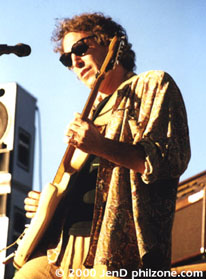
Click
on most photos for full size in new window.
Shortly
after this exciting East Coast Spring tour finished up,
before the finale Mtn. Aire 2000 performance, Philzone.com
was lucky enough to catch The Peev for a few words.
Philzone: You've played with Phil before at a couple of Seva benefits with Crosby, Phil, and Nash. Could you tell us a little bit about them?
Pevar:
I think the first time I ever played with Phil was at a Seva benefit in
San Francisco. [Editor's note: The first Crosby, Nash, Phil and Pevar
Seva Benefit was 2/13/94 at the 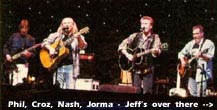 Masonic
Auditorium, San Francisco, CA] To me, being from the east coast, the whole
San Francisco scene has this immense musical history – this legacy. To
have an opportunity to go there and have a chance to play with some of
the "big fish" in town was a huge thrill for me. I met Bob Weir there,
Wavy Gravy, the guys from Hot Tuna, and Jorma who jammed with us that
day. Crosby, Nash, Phil and I played Box of Rain and Crosbys' tune
Laughing. It was honest, rough and a lot of fun! I was honored
to be a part of that ensemble.
Masonic
Auditorium, San Francisco, CA] To me, being from the east coast, the whole
San Francisco scene has this immense musical history – this legacy. To
have an opportunity to go there and have a chance to play with some of
the "big fish" in town was a huge thrill for me. I met Bob Weir there,
Wavy Gravy, the guys from Hot Tuna, and Jorma who jammed with us that
day. Crosby, Nash, Phil and I played Box of Rain and Crosbys' tune
Laughing. It was honest, rough and a lot of fun! I was honored
to be a part of that ensemble.
The second Seva show was also a treat for
me because not only did I get a chance to play with Phil, Graham, David
(with the addition of CPR keyboardist, James Raymond) again, but also with Jackson [Browne], who was also on the bill. [Editor's
note: Show date was 5/15/98 at the Berkeley Community Theatre, CA] When
we were sitting around the dressing room playing together Jackson invited
me play with him during his set, as well. What a treat! Someone came up
to me after the end of the show and jokingly said, "Hey Pevar, you get
voted MVP today for playing with all these guys!"
again, but also with Jackson [Browne], who was also on the bill. [Editor's
note: Show date was 5/15/98 at the Berkeley Community Theatre, CA] When
we were sitting around the dressing room playing together Jackson invited
me play with him during his set, as well. What a treat! Someone came up
to me after the end of the show and jokingly said, "Hey Pevar, you get
voted MVP today for playing with all these guys!"
PZ: So I assume Crosby had some influence on you playing with Phil?
I'm sure that David was instrumental in getting me the audition with Phil. Theyve been friends for a long time and I think Crosby called Phil and said, "You've gotta call the Peev."(laughter)
PZ: You've just come off of a fourteen show tour with Phil, now that you've had some time to reflect on it, how do you feel?
Jeff Pevar: It's an honor to be one of the musicians Phil has chosen to celebrate the playing of this music. Besides his immense talent, Phil is a gentle soul and a wonderful guy. I assume that after years of playing with many of the same musicians with the Dead for many years it is very exciting for him to get a chance to get out and play with a lot of different players more recently. I think that it helps him redefine who he is as a musician while breathing new life into this music. I imagine it's interesting for him to hear all the vast interpretations of these songs with all these different ensembles. It's also fun for all of his new "Friends" who are getting a chance to play this material with him. Most of the people who have been coming to these shows seem to really be enjoying themselves too!
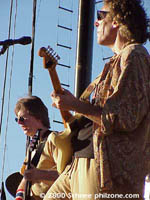 PZ:
How familiar are you with the Dead songs? I mean there were about 80 in
rotation…
PZ:
How familiar are you with the Dead songs? I mean there were about 80 in
rotation…
Pevar: I'd say I knew about ten percent of them at best. Certainly, I'd heard some of the material before and there were a few songs that I had played before, but most of the material was brand new for me. I think I may have worked harder preparing for the Phil and Friends tour than just about anything else I've ever undertaken – especially as far as the time I had to prepare for the tour in relation to the amount of material that was involved. It wasn't just learning how to play the songs on guitar, but I was also singing a lot of harmony vocals, as well as lead vocals on a few of the tunes. It was a great opportunity, but a huge undertaking, as I wanted to try to do the material justice. Whenever I take something on, I always try to do the best I can – that’s just the way I am.
PZ: Did you have any idea that it was going to be that tough when you said, "Okay, yeah I'm in?" Did you have any idea of what you were getting into?
Pevar: Well, I didn't realize there was going to be THAT much material to learn, but it was a challenge that I was determined to undertake to the best of my abilities. After a while I got on a roll – like a musical kamikaze pilot. Of course, I would have preferred not to have to use my charts and lyric sheets during the performances, but there was just too much material to assimilate. I felt like I was handed a scholarship to a college level music course – American Popular Psychedelia 101. (laughter) I accepted and felt happy that I was going to have to go to the new Grateful Dead music school for a while. I've always had a lot of respect for the Dead and their music, but I've learned a lot more about where it comes from after working as hard as I did on it. I have a much deeper perspective about it and more respect for the vast catalogue of their work.
PZ: How about the improvisational aspects of it?
Pevar: I've often been involved with improvisational bands – playing in blues and jazz ensembles, as well as my own band, where the songs are used as springboards for improvisation. But this opportunity was unique, because of the depth in the songwriting, Phil's unique approach to playing the bass, as well as his overall concept to ensemble playing. More so than not, Phil seems to prefer when everyone is "blowing" at the same time, instead of just one instrumental voice peaking out above the rest. It's all these musical colors blending at the same time. I'm not sure where the term came from, but I have often referred to it as a sort of "Cosmic Dixieland" approach to music. (laughs)
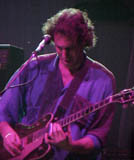 Myself,
I'm a fan of economy....meaning trying to get more out of playing less....making
room for everyone, musically. In my opinion, the space in between the
notes is just as important as the note being played. With so much going
on, it makes it more challenging for that "special dynamic" to happen.
The ensemble has to work harder to make it work well musically. I felt
like there were times when we really "got it"- we were really listening
to one another, and playing off one another.... And there were other times
when it felt slightly confused..... Then again, that's an emotion and
a feeling that maybe Phil is going for as well.
Myself,
I'm a fan of economy....meaning trying to get more out of playing less....making
room for everyone, musically. In my opinion, the space in between the
notes is just as important as the note being played. With so much going
on, it makes it more challenging for that "special dynamic" to happen.
The ensemble has to work harder to make it work well musically. I felt
like there were times when we really "got it"- we were really listening
to one another, and playing off one another.... And there were other times
when it felt slightly confused..... Then again, that's an emotion and
a feeling that maybe Phil is going for as well.
Ultimately, I was quite challenged by the music and the environment. I realized that I had to check some of the rules and regulations that I go by at the door. I was operating by a whole new and different set of rules, playing with this ensemble, and to learn something so new and different was very exciting for me at this point in my career. As you know, the other guitarist in this ensemble was Jimmy Herring, who is absolutely incredible. We enjoyed working together a lot. We often played lead at the same time, but at other times I looked to use other colors, or use other sounds, for sonic diversity.... I'd sometimes play some lap steel or a little mandolin.... I had a lot of fun playing rhythm guitar and locking in with John Molo, who is one of the best drummers that I've ever played with... and Rob Barracco is also a topnotch keyboardist and vocalist. I think that everyone had a lot of fun playing music together in this band.
PZ: How often is it for you to be in a two-guitar situation?
Pevar: I have played in a number of other ensembles with two guitarists. When I came out for rehearsals I was immediately blown away by Jimmy Herring’s musicality as well as how sweet of a guy he is. He's an astounding musician. He can easily play lines on the guitar that I only dream about. We spent a good deal of time playing together - even after the daily band rehearsals were over, just to get more familiar with guitar parts and each others styles. We each have a pretty wide swath of vocabulary and sounds to choose from - some stylistically overlapping and some were quite different.
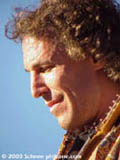 It
was interesting and challenging to have another very powerful soloist
on guitar in the ensemble, and there were times that I opted not to play
as much lead guitar as I normally would. Certainly there were plenty of
times when I just went for it, trying to both emulate the direction of
what I thought Phil was looking for combined with what made musical sense
to me.
It
was interesting and challenging to have another very powerful soloist
on guitar in the ensemble, and there were times that I opted not to play
as much lead guitar as I normally would. Certainly there were plenty of
times when I just went for it, trying to both emulate the direction of
what I thought Phil was looking for combined with what made musical sense
to me.
Ultimately, I felt the reason why we were there was to be an extension of Phil's conceptual musical self… in our own representative way. The great thing about working with someone who has a unique vision, as Phil does, is the more you get involved with different concepts, the more it becomes part of your own interpretation of the music… Something that powerful and unique tends to rub off on you.
PZ: How about when you had Warren Haynes in the mix too?
Pevar: As you know, Warren is one of the
most talented guys you'll ever meet - he plays AND sings his ass off!
Having that incredible combination, it's not surprising to see how well he's done for himself. We had hung out together a few times in the
past, running into each other on the road or through mutual friends, but
we never actually played together before he sat in with us at the Beacon.
It was really fun to get a chance to play in an "Ensemble Du Jour" with
both Warren and Jimmy. Certainly to make it work with two other guitar
players who are both strong soloists, there has to be a lot of listening
going on. To me, that's what it's all about! Waiting for the right moment.
Understatement and the payoff!!
well he's done for himself. We had hung out together a few times in the
past, running into each other on the road or through mutual friends, but
we never actually played together before he sat in with us at the Beacon.
It was really fun to get a chance to play in an "Ensemble Du Jour" with
both Warren and Jimmy. Certainly to make it work with two other guitar
players who are both strong soloists, there has to be a lot of listening
going on. To me, that's what it's all about! Waiting for the right moment.
Understatement and the payoff!!
For instance, I'm a big fan of B.B. King’s playing. That's one of the things that I learned from watching him - he'll play just one big expressive note and it will go right through you. It's like "BING!" [vocally imitates B.B.'s guitar] and pins you to the back wall. To me there's a profundity to the "less is more" approach, because it involves lyricism and it makes the space in-between the note just as important as the notes themselves. So again, in this situation it was quite different, all of this information going on… filtering, and swirling about - it was a wonderfully challenging situation.
PZ: What about the show with
Branford at the Beacon? That was quite a night!
What was that experience like for you?
 Pevar:
The guy just walks into a room and it's, "BAM!" He's a presence.... a
force of nature.....just an amazing musician. To have him come in and
grace the stage with his musicality - it was such a treat! A master level
jazz musician coming in and playing Grateful Dead music. What a phenomenal
thing that is!
Pevar:
The guy just walks into a room and it's, "BAM!" He's a presence.... a
force of nature.....just an amazing musician. To have him come in and
grace the stage with his musicality - it was such a treat! A master level
jazz musician coming in and playing Grateful Dead music. What a phenomenal
thing that is!
On another level it was a treat for me because years ago, when I was playing with Ray Charles’ Band, one of the trombonists in the band was Branford's brother, Delfeyao Marsalis, and we used to hang out a bit together. So to look at Branford's face and recognize the family resemblance... that was a neat thing for me.
I felt that we achieved some great dynamics as an ensemble when Branford was included in the mix. The other guys were also quite excited to play with him and there was a lot going on.... I waited a while, and finally started throwing out some phrases. I'd play and he'd look over at me like, "Alright man, cool! That guy can play too!"
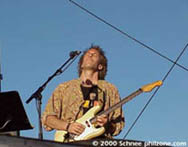 PZ:
We noticed you had a bunch of different guitars up on stage. Why so many?
PZ:
We noticed you had a bunch of different guitars up on stage. Why so many?
Pevar: For a number of reasons: One, it's the one place I can still be promiscuous! (laughter) But really, I look at each guitar having it's own unique voice. Besides a guitar’s basic function or "twang factor" (laughs) I look at each guitar as a sort of "sonic paintbrush" that has a unique tonal-color spectrum. So I might think about the characteristics of a particular instrument depending on the tune we might be playing....."Hmm, maybe the Gibson 345 for this song, or my old Strat might compliment this song well... or my 60's Gretch Country Gentleman just might be the ticket in this song." I also acquired a very cool Brian Moore guitar for the tour that I really like a lot...."
There were also times when, for no particular reason, I just felt like playing a certain guitar. Ultimately, you develop a relationship with your guitars and have a pretty good idea what to expect out of them. I also work with a lot of different tunings for slide playing. I set up a few instruments with bigger strings for that purpose...either tuned to an E chord, or G chord, or an A chord depending on the song. I'd look at the set-list and decide which tunings I'd use from night to night. I also brought out a couple lapsteels and a mandolin on tour just to have some other textures available. I used my Ovation mandolin on Ripple - which we did a couple of times, and
I played a lap tuned to an E chord on Pride of Cucamonga trying to emulate the pedal steel on that tune. I used a G lap tuning for Friend of the Devil which I thought might be a unique approach to that classic song.
PZ: You said you changed your thinking and musical approach when playing with Phil. You've played a few local shows here in CT since - did you find your playing or approach was any different?
Pevar:
Definitely. I believe that everything that you undertake as a person affects
your music. Not just music, ya know, but also what you ate for breakfast,
what you talked 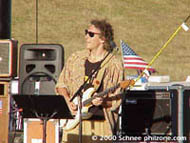 about
with your friend that afternoon, where your love relationship is at, if
your dog bit you the night before (laughs). That aside, after spending
all that time learning Grateful Dead songs, I'll never be the same. There's
a certain intimacy I now have with that music that's part of my soul…
part of my embroidery. Hearing Phil play bass all those nights - after
standing next to him for all those shows, my musicality has been altered
from the experience. It started off as a new sound to my ears and after
a few gigs into the tour it felt like I had been hearing it my entire
life.
about
with your friend that afternoon, where your love relationship is at, if
your dog bit you the night before (laughs). That aside, after spending
all that time learning Grateful Dead songs, I'll never be the same. There's
a certain intimacy I now have with that music that's part of my soul…
part of my embroidery. Hearing Phil play bass all those nights - after
standing next to him for all those shows, my musicality has been altered
from the experience. It started off as a new sound to my ears and after
a few gigs into the tour it felt like I had been hearing it my entire
life.
PZ: Could you share any small anecdotes from the Spring tour?
Pevar: Well, one of the nicer things that comes to mind is that a bunch of us got to play softball together in Central Park while we were in New York City. Phil brought his boys, Graham and Brian, and Rob Baracco brought his son too, and we all had a blast playing. It was nice to do something outside of the musical scene together. Phil and [his wife] Jill have done such a great job raising their kids - they're wonderful guys. That was really special for me to see and experience. And wouldn't you know.... all those kids are really good pitchers, too - I mean REALLY killer pitchers. They have careers in front of them, possibly - I think that they're that good!
by Bret Heisler and Andy Gimigliano
Interview written & produced by 2012 Productions.
©2000 www.philzone.com and www.2012productions.com. All rights reserved.
All photos ©1999-2000 by photographers noted.
This interview may not be reprinted anywhere in any form - online or offline -
without the express written consent of the photographer and Philzone.com.
However, we certainly encourage you to link here.
. .